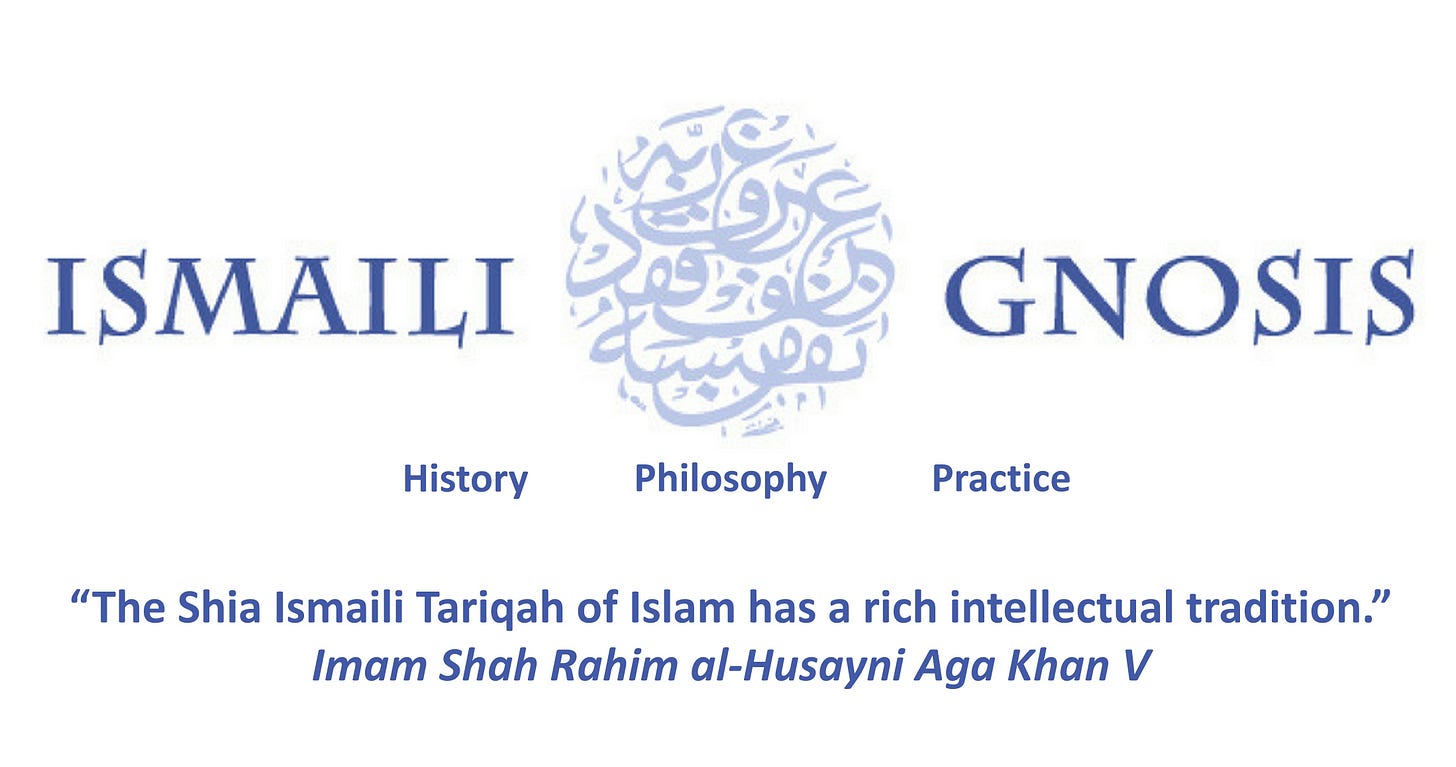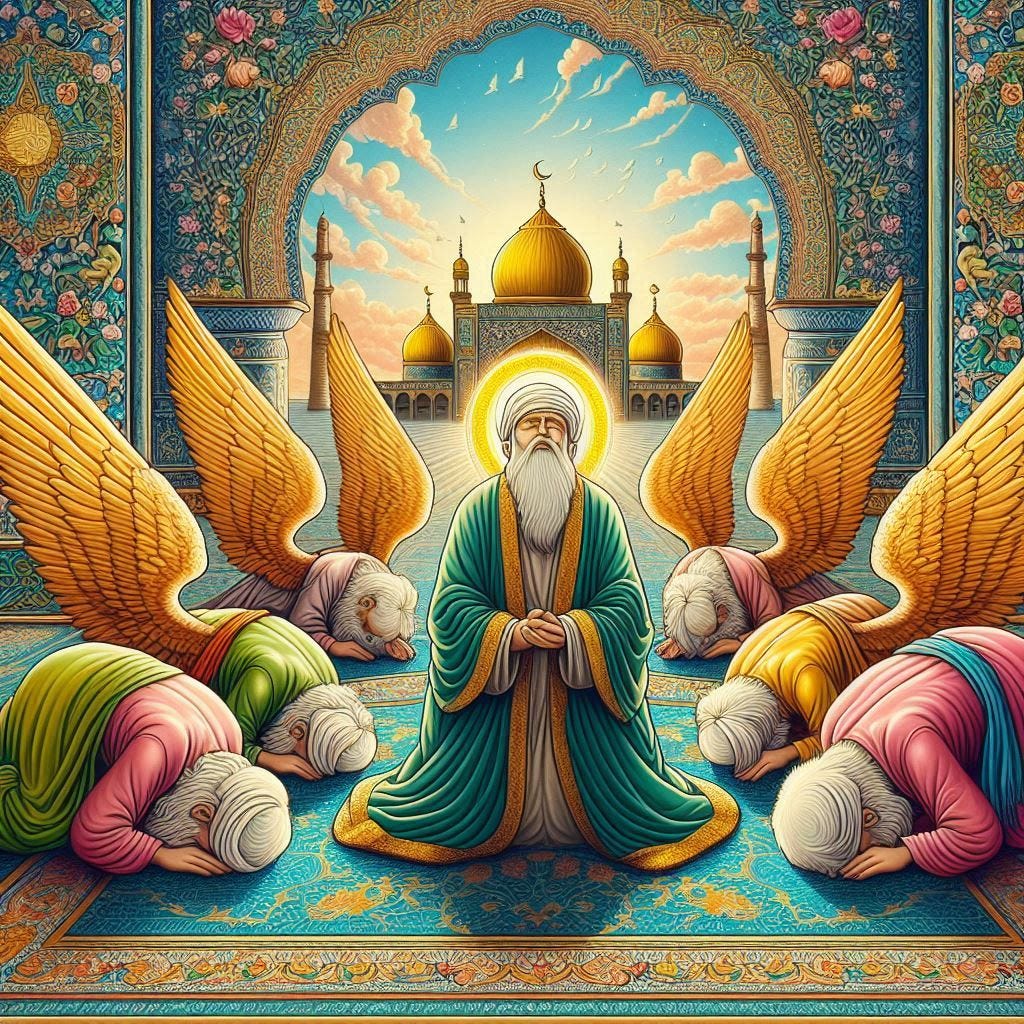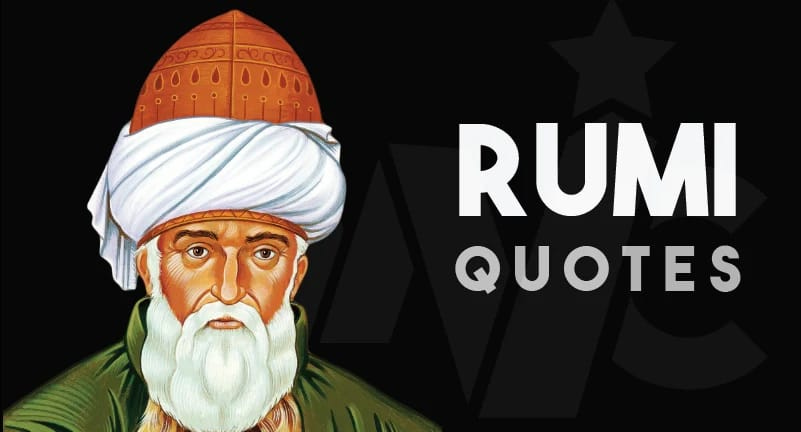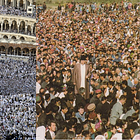Ismaili Imamology (1): Adam as the First Qiblah Established by God (9 Min. Read)
Ismaili Imamology Series: Short Essays on Esoteric and Spiritual Dimensions of Imāmat in Ismāʿīlī Thought
“The first qiblah that God
—may He be praised—
commanded to turn towards is Adam,
the Living Qiblah (ḥayy qiblah).”
— al-Mu’ayyad fi’l-Dīn al-Shīrāzī
(Majālis al-Mu’ayyadiyyah, Vol. 2,
Majlis No. 57, 350, ed. Ḥātim Ḥāmid al-Dīn)
Adam: Vessel of the Holy Spirit, First and Living Qiblah
As many readers of Ismaili Gnosis will recognize, the above quotation from the celebrated Fāṭimid Ismā‘īlī dāʿī Sayyidnā al-Muʾayyad fī'l-Dīn al-Shīrāzī (d.1077) is a commentary on the well-known Qur’ānic account of God’s command to the angels to prostrate before Ḥaḍrat Adam⁽ᶜ⁾. For those interested in a deeper understanding of Ismā‘īlī Imāmology, it is crucial to note that this command was issued only after a specific Divine act: the breathing of God’s spirit (rūḥ) into Adam⁽ᶜ⁾. Only then were the angels ordered to perform prostration (sujūd), indicating that Adam⁽ᶜ⁾’s pure soul had become the vessel of the Holy Spirit (al-Rūḥ al-Qudus). With God’s command — and the angels’ obedience — Adam⁽ᶜ⁾ becomes, according to the Qur’ān, the very first qiblah (direction of divine orientation):
“Behold, your Lord said to the angels: ‘I will create a human being from clay. So when I have shaped him and breathed into him of My spirit (rūḥī), then fall down to him in prostration (sājidīn).’ So the angels prostrated (sajada) themselves, all of them together, except Iblis; he was arrogant and became one of the disbelievers (al-kāfirīn).”
The presence of the Holy Spirit is thus the reason for the angels’ prostration to Ḥaḍrat Adam⁽ᶜ⁾. This same Spirit — made manifest in Adam⁽ᶜ⁾’s soul — is transmitted through the succession of Prophets and Imāms, so that in accordance with God’s eternal sunnah (habit or custom), in which there is no alteration (Q. 17:77), there is always, like Adam⁽ᶜ⁾ — “the first qiblah that God commanded to turn towards” — a divinely appointed khalīfah (vicegerent) of God “in the earth” (Q. 2:30): the “Living Qiblah” for every age.
Yet, as the Qurʾān makes clear, not all accept (i.e., properly recognize) or submit (i.e., prostrate) to the divinely established authority (amr) manifest in the Adam of the Time (Ādam-i Zamān)⁽ᶜ⁾. The eminent philosophical theologian Muḥammad b. ʿAbd al-Karīm al-Shahrastānī (d. 1153) — who outwardly presented as Sunnī but was secretly a high-ranking Ismāʿīlī dāʿī — makes this point forcefully in his esoteric Qurʾān commentary. What follows is an excerpt from Toby Mayer’s introduction to his translation of al-Shahrastānī’s Mafātīḥ al-Asrār wa-Maṣābīḥ al-Abrār (The Keys to the Arcana and the Lamps of the Godly).
Esoteric Meaning (Ta’wīl) of Q. 2:34: True Prostration to God Requires Prostration to Adam⁽ᶜ⁾
Toby Mayer, “Translator’s Introduction,” in Keys to the Arcana: Shahrastānī’s Esoteric Commentary on the Qur’an, trans. and ed. Toby Mayer (Oxford: Oxford University Press in association with The Institute of Ismaili Studies, 2009), 18.
Shahrastānī evaluates the different theological movements of Islam in the light of the story of Satan’s [i.e. Iblīs’] refusal to prostrate before Adam. Adam is significantly presented here as the original “mediator of the Command” (mutawassiṭ-i amr), that is, the functional archetype of the Imam in Shī‘ism. It is vital in this connection that Shahrastānī claims that the group he himself espouses is alone in its true commitment to what God and His Messenger said. The definitely Ismā‘īlī thrust of the discussion in fact only comes out by matching it with the equivalent portion of the Mafātīḥ, i.e. the arcana of Q. 2:34 where this story is first referred to. All becomes explicit here in Shahrastānī’s comments:
[ ... ] Just as Iblīs did not acknowledge the present, living, current Imam [al-imām al-hāḍir al-ḥayy al-qā’im], the commonalty [al-‘āmma] are the same as that, while the expectant Shīʿa only acknowledge the awaited, hidden imam. And God has blessed servants on earth who do not get ahead of Him in speaking and they act on His Command, servants who are the purified servants of God, over whom Satan has no authority [ ... ].
In this explosive statement, our author explicitly criticises both the Sunnī masses (al-‘āmma) and the ‘expectant’, i.e. Twelver, Shī‘a (al-shī‘a al-muntaẓira) for refusing, like Iblīs, to acknowledge the pontifex right in their midst, who is referred to as ‘the present, living, current Imam’ (al-imām al-hāḍir al-ḥayy al-qā’im) — a concept which it would seem wayward to account for as other than Ismā‘īlī.
Shahrastānī goes on to equate the said purified servants’ speech with God’s, their hand with God’s, allegiance to them with allegiance to Him and war on them with war on Him. He then says:
Whoever loves them has loved God, whoever submits to them has submitted to God, whoever prostrates to them has prostrated to God, whoever turns towards them has turned towards God and whoever places confidence in them has placed confidence in God. 'So what is it with these people who don't even understand a statement' [Qur’an 4:78] and they talk on about how the prostration to Adam took place and what its interpretation was?! They do not grasp that prostration to Adam was prostration to God — rather, that so long as prostration to God is not combined with prostration to Adam, it is not prostration to God, just as, so long as the formula ‘no god but God’ is not combined with the formula ‘Muḥammad is God’s messenger’, it is not the formula of testification and of sincerity!
Rūmī on Adam’s Spiritual Reality and Iblīs’ Spiritual Blindness
Like the Ismāʿīlī dāʿī Shahrastānī, the renowned Ṣūfī poet Jalāl al-Dīn Rūmī (d. 1273) emphasized both Adam’s exalted rank and his role as the qiblah — the direction of prostration — for the angels. He also highlighted Iblīs’ tragic refusal, rooted in arrogance and spiritual blindness. For Rūmī’s profound insights on these themes, we turn to William Chittick, one of his foremost translators and interpreters in English.
William C. Chittick, The Sufi Path of Love: The Spiritual Teachings of Rumi (Albany: State University of New York Press, 1983), 83:
The Koranic story of Adam and the devil, or “Iblis” as he is usually called in Islamic sources, is rich in imagery and symbolism, of which Rūmī takes full advantage. […] In the Koran God addresses humanity as follows:
We created you, then We shaped you, then We said to the angels: “Bow yourselves to Adam.” So they bowed themselves, save Iblis. He was not of those that bowed themselves. Said He, “What prevented thee to bow thyself when I commanded thee?” Said he, “I am better than he; Thou createdst me of fire, and him Thou createdst of clay.”
Rūmī points out a number of lessons to be learned from these and similar Koranic verses. For example, they confirm Adam’s exalted spiritual station; they show that Iblis’ sin derives fundamentally from spiritual blindness, or the inability to see meaning beyond form; and his [i.e., Iblis’] words prefigure several of mankind’s basic sins, especially pride, envy, and disobedience.
Of Adam, who was peerless and unequalled,
the eye of Iblis saw naught but clay.
(Mathnawī III 2759)
When the angels prostrated
themselves to him,
Adam said to that one
who saw only the outward,
“Simpleton! Do you consider it proper
that I be but a tiny body?”
(Dīwān-i Shams-i Tabrīzī 15122)
Within the cowlike body is a prince,
a treasure placed in the ruins,
So that an old ass
— I mean Iblis —
would flee from that priceless jewel
and see only the cow, not the king.
(Mathnawī VI 3581-82)
Iblis saw things separately:
He thought that we are apart from God.
(Dīwān-i Shams-i Tabrīzī 16532)
Do not gaze upon
Adam’s water and clay, like Iblis:
Behold a hundred thousand rose gardens
behind that clay.
(Dīwān-i Shams-i Tabrīzī 18226)
With both eyes,
see the beginning and the end!
Beware! Be not one-eyed,
like the accursed Iblis!
(Mathnawī VI 1709)
Close your Iblis-like eye for a moment.
After all, how long will you gaze upon form?
How long? How long?
(Mathnawī III 2300)
For hundreds of thousands of years
the accursed Iblis was a saint
and the prince of believers,
But then in his pride
he traded punches with Adam
and was disgraced like dung at daybreak.
(Mathnawī I 3296-97)
This man is like Iblis,
for his pride and blind imitation
make him disdain service to the saint.
He says, “God is sufficient
as an object of my prostration.”
Adam answers him,
“This prostration is to Him.
You see two because you
have gone astray and denied.”
The dust of the envier's protests
causes a curtain to descend
between the star of good fortune
and his eyes. . . .
(Dīwān-i Shams-i Tabrīzī 9605-9607)
Envy’s veil has made him
into an ass on ice.
He has polluted all his wings
and feathers with this filth.
(Dīwān-i Shams-i Tabrīzī 9613)
— Jalāl al-Dīn Rūmī
(Quoted in William C. Chittick,
The Sufi Path of Love:
The Spiritual Teachings of Rumi, 83–84)
The Holy Spirit and Veneration of the Perfect Man of the Time
In the final passage of this article, ʿAllāmah Hunzai reflects on the Qurʾānic teaching that the Holy Spirit, first breathed into Adam⁽ᶜ⁾, was also breathed into figures like Maryam (i.e., Mary, the mother of Jesus⁽ᶜ⁾). This suggests that the Spirit endures not only through the chain of Prophets and Imāms, but is also granted to spiritually exalted believers.
In light of esoteric Ismā‘īlī Imāmology, the Holy Spirit (al-Rūḥ al-Qudus) remains ever-present in the Perfect Man (al-Insān al-Kāmil) of every era — the Prophet or Imām of the Time — whose veneration, like the angels’ prostration to Adam⁽ᶜ⁾, the First and Living Qiblah, is divinely ordained.
It is clear and explicit from the Wise Qur’ān that the Spirit which God breathed into the first man of that cycle, i.e. Ḥaḍrat Ādam, was also breathed into Ḥaḍrat Maryam (see verses: 15:29; 21:91; 32:9; 38:72; 66:12). This shows that the Holy Spirit which had appeared in Ḥaḍrat Ādam has continued through the sacred chain of the Prophets and Imāms. In fact, the light of this Spirit has been attained by the religious dignitaries, such as Ḥaḍrat Maryam, who was neither a Prophet, nor an Imām, but only a Ṣiddīqah — a truthful lady. Then you have to certainly believe that the same Divine or Holy Spirit, due to which Ḥaḍrat Ādam had become the object of the prostration of angels, is still in the Perfect Man
Therefore, every Prophet and Imām is worthy of veneration and honour, and no sensible person would ever say that this is disbelief [kufr] or polytheism [shirk] when we know that the veneration (i.e. prostration) which the angels had done to Ḥaḍrat Ādam, according to the command of God, was far greater than any veneration. This is a fundamental proof of the exalted rank of the Perfect Man.
‘Allāmah Naṣīr al-Dīn Naṣīr Hunzai, Ḥaqīqī Dīdār, trans. Faquir Muhammad Hunzai and Rashida Noormohamed-Hunzai, True Vision, 7.
Ya ‘Ali Madad,
Khayāl ‘Aly
July 29, 2025
khayal.aly@gmail.com
Follow on Instagram:
khayal.aly | ismaili.poetry
ismailignosis | ismailignosis.blog







